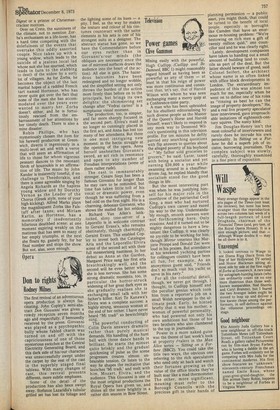Television
Power games
Clive Gammon
Mixing easily with the powerful, Hugh Cudlipp (Cudlipp and Be Damned, BBC 1) might reasonably regard himself as having been as powerful as any of them — at least in that his reign of power was more continuous and consistent than, let's say, that of Harold Wilson with whom he was seen exchanging many a merry quip at a Conference-time party.
A man who has been upbraided for his ebullient editorialising by such diverse people as the Master of the Queen's Horse and Harold himself, wasn't likely to respond in any meek way to Desmond Wilcox's questioning in this television profile. For ten minutes he deftly parried any searching questions with flip answers to queries about the alleged poverty of his boyhood — "My father sold groceries to grocers," he said. Later, taxed with being a socialist and yet earning 00,000 a year while swanning around in a chauffeurdriven Jag, he replied blandly that socialism stood for the good things in life.
But the most interesting part was when he was justifying himself for his major role in the overthrow of the patriarchal Cecil King, a man who had nurtured Cudlipp's own career and eased his way to the top. Understandably enough, smooth answers were .nof forthcoming here. Only evasions. And if it turned out to be mighty dangerous to have a lieutenant like Cudlipp, it was clearly no joy-ride to be working for him, though Mirror veterans like Marjorie Proops and Donald Zec were loud in his praises. But attendance at his weekend yachting parties for colleagues couldn't have been all fun, for example. As an anonymous guest said, "Friends don't so much visit his yacht as serve in his navy."
For all the colourful detail, though, we never got through, I thought, to Cudlipp himself and the peculiar genius which took him from a reporter's job on a small Welsh newspaper to the ultimate peak. Early, he hinted briefly that it was his mother, a woman of powerful personality, who had powered not only his own ambitions but those of his two brothers who also clambered to the top in journalism.
Power in a more naked guise was the theme of last week's look at property ric!alers in the Man Alive series — Sitting on _a For tune (BBC2). You could take the title two ways, the obvious one
referring to the rich speculators who need only sit back and watch their fortunes growing as the value of the office blocks they've built soar like a mad thermometer. The other, more significant, meaning must refer to the Borough Councils with the precious gift in their hands of
planning permission — a public asset, you might think, that could be turned to the benefit of local . people, especially in boroughs like Camden that have an enormous re-housing problem: "We're bestowing on rich men a gift of twenty million quid," one councillor said and he was clearly right.
Lately, development companies have taken to handing out a small amount of building land to councils as part of the deal, But the latter should beware of greed, said Colonel Seifert, the architect whose name is so often linked with office block developments in London. The extraordinary impudence of this was almost too much for me, especially when he went on to define one of his roles as "rinsing as best he can the image of property developers." He, and a real live property speculator later interviewed, gave irreproachable imitations of eighteenth-century squires. The nasty kind.
Jim Douglas-Henry isn't the most colourful of interviewers and rarely does he intrude his own personality. In Sitting on a Fortune he did a superb job of incisive, burrowing journalism. The complex subject was slowly, carefully, thoroughly examined in a fine piece of exposition,










































 Previous page
Previous page